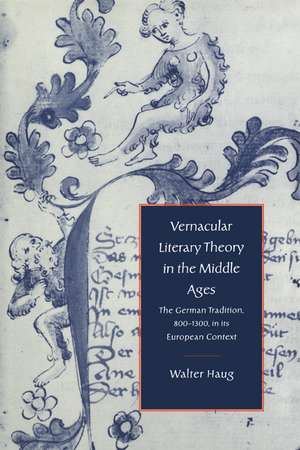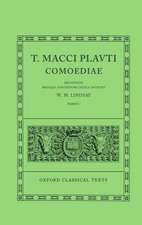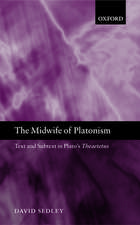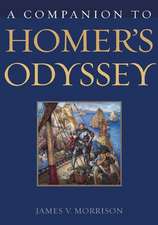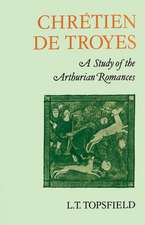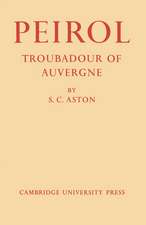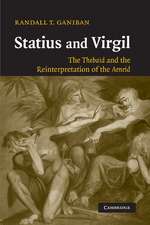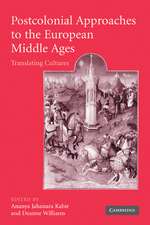Vernacular Literary Theory in the Middle Ages: The German Tradition, 800–1300, in its European Context: Cambridge Studies in Medieval Literature, cartea 29
Autor Walter Haugen Limba Engleză Paperback – noi 2006
| Toate formatele și edițiile | Preț | Express |
|---|---|---|
| Paperback (1) | 371.41 lei 6-8 săpt. | |
| Cambridge University Press – noi 2006 | 371.41 lei 6-8 săpt. | |
| Hardback (1) | 851.69 lei 6-8 săpt. | |
| Cambridge University Press – 5 mar 1997 | 851.69 lei 6-8 săpt. |
Din seria Cambridge Studies in Medieval Literature
-
 Preț: 269.83 lei
Preț: 269.83 lei -
 Preț: 237.74 lei
Preț: 237.74 lei -
 Preț: 283.25 lei
Preț: 283.25 lei -
 Preț: 281.49 lei
Preț: 281.49 lei -
 Preț: 237.34 lei
Preț: 237.34 lei -
 Preț: 285.54 lei
Preț: 285.54 lei -
 Preț: 287.86 lei
Preț: 287.86 lei - 14%
 Preț: 695.69 lei
Preț: 695.69 lei - 8%
 Preț: 404.47 lei
Preț: 404.47 lei -
 Preț: 282.87 lei
Preț: 282.87 lei -
 Preț: 204.05 lei
Preț: 204.05 lei -
 Preț: 285.37 lei
Preț: 285.37 lei - 11%
 Preț: 587.15 lei
Preț: 587.15 lei -
 Preț: 207.35 lei
Preț: 207.35 lei - 11%
 Preț: 697.28 lei
Preț: 697.28 lei - 11%
 Preț: 639.78 lei
Preț: 639.78 lei -
 Preț: 177.58 lei
Preț: 177.58 lei - 11%
 Preț: 637.36 lei
Preț: 637.36 lei - 11%
 Preț: 637.89 lei
Preț: 637.89 lei -
 Preț: 496.50 lei
Preț: 496.50 lei -
 Preț: 324.62 lei
Preț: 324.62 lei -
 Preț: 282.48 lei
Preț: 282.48 lei -
 Preț: 284.17 lei
Preț: 284.17 lei -
 Preț: 206.57 lei
Preț: 206.57 lei -
 Preț: 337.25 lei
Preț: 337.25 lei -
 Preț: 196.25 lei
Preț: 196.25 lei -
 Preț: 306.68 lei
Preț: 306.68 lei -
 Preț: 230.23 lei
Preț: 230.23 lei -
 Preț: 209.44 lei
Preț: 209.44 lei - 11%
 Preț: 585.10 lei
Preț: 585.10 lei - 11%
 Preț: 583.02 lei
Preț: 583.02 lei -
 Preț: 306.21 lei
Preț: 306.21 lei - 11%
 Preț: 639.58 lei
Preț: 639.58 lei - 11%
 Preț: 642.35 lei
Preț: 642.35 lei
Preț: 371.41 lei
Nou
Puncte Express: 557
Preț estimativ în valută:
71.09€ • 77.25$ • 59.76£
71.09€ • 77.25$ • 59.76£
Carte tipărită la comandă
Livrare economică 21 aprilie-05 mai
Preluare comenzi: 021 569.72.76
Specificații
ISBN-13: 9780521027991
ISBN-10: 0521027993
Pagini: 444
Dimensiuni: 152 x 228 x 28 mm
Greutate: 0.65 kg
Editura: Cambridge University Press
Colecția Cambridge University Press
Seria Cambridge Studies in Medieval Literature
Locul publicării:Cambridge, United Kingdom
ISBN-10: 0521027993
Pagini: 444
Dimensiuni: 152 x 228 x 28 mm
Greutate: 0.65 kg
Editura: Cambridge University Press
Colecția Cambridge University Press
Seria Cambridge Studies in Medieval Literature
Locul publicării:Cambridge, United Kingdom
Cuprins
Translator's preface; Preface to the English edition; Introductory remarks; 1. The background: Christian aesthetics versus classical rhetoric; 2. The problem of the vernacular: Otfrid von Weissenburg and the beginnings of literary theory in Old High German; 3. Literature, allegory and salvation: theoretical positions in Early Middle High German; 4. Religious adaptation of secular forms: the Rolandslied, Brautwerbungsepen ('bridal quests'), the Alexander romance; 5. Chrétien de Troyes' prologue to Erec et Enide and the Arthurian structural model; 6. Divine inspiration and the changing role of the poet in Chrétien's Lancelot and Cligés; 7. Hartmann von Aue's fictional programme: the prologue to Iwein; 8. Hagiographical legend or romance? - Hartmann's prologue to Gregorius; 9. Wolfram von Eschenbach's literary theory: the prologue to Parzival, the metaphor of the bow, and the 'self-defence'; 10. Wolfram's Willehalm: a return to historical romance?; 11. Ethics and aesthetics: Gottfried von Strassburg's literary theory; 12. The truth of fiction: Thomasin von Zerklære and integumentum theory; 13. The Lucidarius A-prologue in the context of contemporary literary theory, and the origins of the prose romance; 14. Magic, morals and manipulation: the emergence of the post-classical Arthurian romance; 15. Rudolf von Ems' Der guote Gêrhart: a programmatic rejection of the correlation between merit and reward; 16. Chance, fortune and virtue: Rudolf von Ems' Alexander; 17. Wolfram's prologue to Willehalm: a model for later hagiographical romances; 18. The new genre of love-romance: suffering as a way to fulfilment. From Rudolf von Ems' Willehalm von Orlens to Ulrich von Etzenbach's Willehalm von Wenden; 19. Konrad von Würzburg: spellbinding artistry and individual moral action; 20. Albrecht's Der jüngere Titurel: magic and moral code in the inscription on the hound's leash; Concluding remarks; Bibliography; Index.
Recenzii
'… an intelligent, sparkling book.' Neue Zürcher Zeitung
'… it is to be hoped that this brilliant and lively book will quickly find a readership in related disciplines of study.' Germanisch-Romanische Monatsschrift
'… it is to be hoped that this brilliant and lively book will quickly find a readership in related disciplines of study.' Germanisch-Romanische Monatsschrift
Descriere
This is a critically acclaimed study of medieval literary theory.
